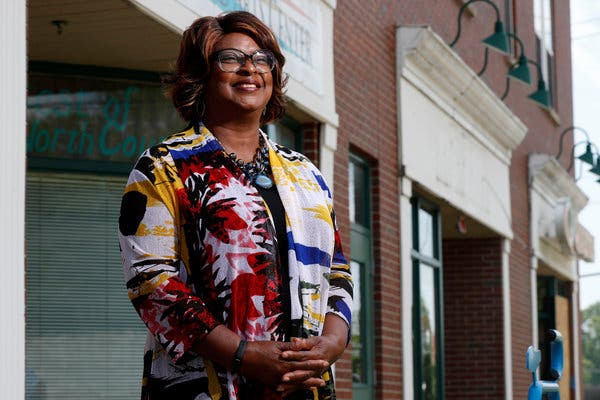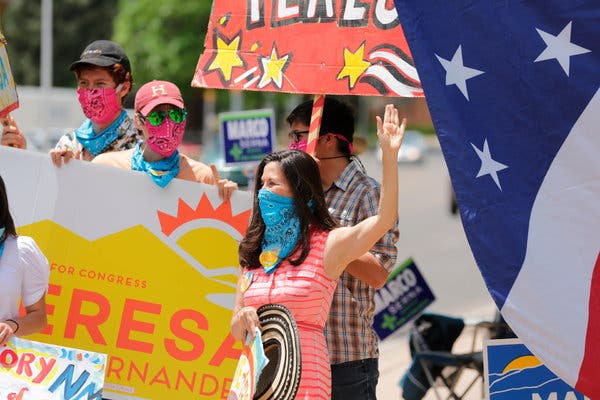Advertisement
Amid widespread protests against police brutality and the coronavirus pandemic, a determined electorate pushed turnout past 2016 levels.

WASHINGTON — As the nation remained gripped by widespread protests against police brutality and systemic racism, black and Hispanic women won elections in multiple states on Tuesday while Representative Steve King, a nine-term congressman with a long history of racist remarks, was ousted in a Republican primary in Iowa.
And as the coronavirus pandemic upended the election process, with millions of absentee ballots flooding clerks offices and consolidated polling locations leading to hourslong waits in cities across the country, a determined electorate pushed turnout past 2016 levels in nearly all of the eight states that held primary contests.
In Philadelphia, voters strode past National Guard troops deployed amid the protests to drop off their absentee ballots. In Washington, D.C., voters observing social-distancing measures waited in line for close to five hours, some not returning home until after midnight, long after the curfew that had been set by the city.
The result was a dramatic night for candidates of color up and down the ballot, largely in Democratic primaries for Congress, state legislatures and city halls, at a time when national leaders like former President Barack Obama are encouraging a nation reeling from the killings of George Floyd, Breonna Taylor, Ahmaud Arbery and other black Americans to embrace civic action and vote.
In New Mexico, 17 women won Democratic primaries for the state legislature. In Iowa, 11 women won primaries for the statehouse. In Monroe County, Pa., Claudette Williams, the first black woman to serve as county chair, won her primary to represent a competitive state House district, a seat that state Democrats are hoping to flip. And in Washington, D.C., Janeese Lewis George, a self-described democratic socialist, beat a sitting city councilman whose mailers said Ms. George wanted “to cut police in Ward 4.” She prevailed by 10 percentage points.
The city of Ferguson, Mo., elected its first African-American mayor, six years after protests against the police killing there of Michael Brown, a black teenager, propelled the Black Lives Matter movement to national prominence.
The mayor-elect, Ella Jones, a city councilwoman, said she had received hundreds of messages from throughout the country, including from congressional leaders, senators and Democratic Party officials.
Her favorite, though, was a tweet from Mr. Obama, who called her victory “a reminder of the difference politics and voting can make in changing who has the power to make real change.”
“My election gives people hope,” Ms. Jones said in an interview. “Everybody is looking for a change, everybody wants to have a better way of life. You don’t want to go four blocks and worry about getting shot. Nobody wants that. It is starting to get better. We are making changes.”
“I have been living in injustice all my life,” she said. “I didn’t just get exposed to it because I became a City Council member.”
Ms. Jones’s victory represented “poetic justice,” said LaTosha Brown, the co-founder of Black Voters Matter, a nonprofit group that works to increase voter engagement.
“Ferguson set off new energy in this country,” Ms. Brown said. “This is a political turning point. The country is being activated in light of this violence.”
For too long, she said, political power had been concentrated among white men. “We are the face of the future of America,” she added.
Many of the candidates of color who won on Tuesday, most of whom are Democrats, still face difficult battles in November. And Republican women won in five House districts expected to be competitive this November, a significant shift as the party has tried to recruit more women in recent years.
Progressive activists hailed Tuesday’s primary results as evidence that the widespread protests can spur political action, leading to important gains in electing more candidates who focus heavily on issues of race and inequality.
Adrianne Shropshire, the executive director of BlackPAC, a progressive group focused on black voters, said her polling has found that each political crisis brings a growing intensity among black voters to vote, in whichever election is on the ballot, to reject whichever candidate or policy is more closely associated with President Trump.
“People believe that every vote they cast is a message being sent to Donald Trump, no matter what they’re voting for,” Ms. Shropshire said.
Mayra Macías, the executive director of the Latino Victory Project, which endorsed several candidates who won on Tuesday, said the protests of the last 10 days illustrated the need for more diverse elected officials.
“We are winning with people we need, who can represent the communities that are suffering,” she said.

Democrats see the wins as a prelude to November, when they hope to recapture the White House in part by relying on voters who are enraged by Mr. Trump’s rhetoric and actions.
“The attacks that the president has been consistent about making are against people of color, immigrants and especially women,” said Representative Tony Cárdenas, Democrat of California and the chairman of BOLD Pac, the Congressional Hispanic Caucus’s political action committee. “I think that a lot of women are stepping up and saying, ‘I just can’t leave it to people like him, I need to do my part.’”
States that aggressively promoted mail voting saw large increases in turnout compared with their 2016 primaries — even though four years ago there were competitive presidential races in both parties and Tuesday’s contest featured only a long-decided Democratic race.
Iowa, which mailed absentee ballot request forms to every registered voter, had the largest turnout for a June primary in the state’s history, according to Paul Pate, the secretary of state. In Montana, which mailed ballots to all registered voters, total turnout was up 35 percent compared with the state’s 2016 primary. Turnout was up 14 percent in New Mexico and 12 percent in South Dakota, despite few competitive races there.
The primary results in New Mexico reflected a significant shift. In the Democratic contest for a House seat representing the northern part of the state, Teresa Leger Fernandez, a progressive with deep roots in New Mexico, easily defeated Valerie Plame, the former C.I.A. agent.
Ms. Leger Fernandez is widely expected to prevail in November in her staunchly Democratic district. Her victory would mean New Mexico could have a House delegation that entirely comprises Hispanic and Native American women.
Representative Deb Haaland, a Native American elected to Congress in 2018 to represent the district encompassing Albuquerque, is expected to hold her seat.
And in the southern part of the state, Representative Xochitl Torres Small, a Hispanic first-term Democrat, is running for re-election against Yvette Herrell, who won the Republican primary. Ms. Herrell is an enrolled member of the Cherokee Nation.
The congressional delegation will represent a state where Anglos are in the minority, accounting for 37 percent of the population. Hispanics make up 49 percent of New Mexico’s population while Native Americans account for about 11 percent.
Throughout her campaign, Ms. Leger Fernandez emphasized her family’s long history in the state — her parents helped institute the state’s early bilingual education programs, which she views as a key element of the state’s multicultural identity.
And she drew on her father’s experience as a rancher bringing meat to restaurants with signs on the door that read “No dogs or Mexicans.”
“We bring these voices, we know what it is like to be from a community that has suffered,” Ms. Leger Fernandez said.
While law enforcement in New Mexico is not involved in as much race-based conflict as elsewhere, partly because the police force reflects the demographics of the population, there are other examples of entrenched inequality in the state, Ms. Leger Fernandez said.
“We have the disproportionate impact from Covid-19 and we have failed to invest our communities of color, in our working-class communities,” she said. “Those are groups that are suffering more, but I think what we have at this moment is a coalition that is willing to call it by its name — systemic racism — and a desire to address it.”
In a race certain to be competitive in November, Christina Hale, a Cuban-American state legislator who won a Democratic congressional primary in Indiana on Tuesday, will face Victoria Spartz, a Ukrainian-born Republican state senator who self-funded her primary campaign and overcame 14 primary opponents.
They are seeking to represent the state’s Fifth Congressional District, which covers suburbs north of Indianapolis and several rural counties. Ms. Hale would be the first Latina congresswoman from Indiana.
Ms. Hale, whose suburban and rural district is just 9 percent black and 5 percent Hispanic, said the Trump era, along with the events of recent weeks, had spurred more women to become involved in politics.
“We’ve had traditionally low voter turnout in Indiana,” Ms. Hale said in an interview. People around her were starting to take their role in the democratic process more seriously, she said, “turning out to vote, and stepping up to be candidates themselves.”
In Idaho, Paulette Jordan, a Native American former state representative who previously ran for governor, won a Democratic Senate primary. Though she faces an uphill battle to defeat Senator Jim Risch in her heavily Republican state, Ms. Jordan’s candidacy gives Idaho, with its large Native American population, the chance to elect the first Native American to statewide office since Larry Echo Hawk was elected attorney general in 1990.
In Ferguson, Ms. Jones said she hoped other women of color would see her win as a reason to be persistent — she lost her first bid for mayor in 2017.
As she waited for the election results on Tuesday night, she sat on a bench outside the Ferguson Community Empowerment Center, surrounded by a few supporters wearing face masks.
The site used to be home to a QuikTrip convenience store that was burned down during the 2014 protests. The bench is dedicated to Michael Brown.
Reid J. Epstein reported from Washington, Jennifer Medina from Los Angeles and Nick Corasaniti from Easton, Conn. Simon Romero contributed reporting from Albuquerque and Rachel Shorey contributed reporting from Washington.

